Americans are feeling increasingly uneasy about their financial future.
Nearly 7 in 10 (69%) say financial uncertainty has led them to feelings of anxiety and depression, according to a recent survey from Northwestern Mutual — an 8-percentage-point increase from 2023.
It’s tempting to point to large-scale financial trends to help explain the uptick. Americans hold near-record levels of credit card debt, for instance, amounting to $1.18 trillion, according to data from the Federal Reserve Bank of New York. And consumers are still trying to gauge how shifting U.S. tariff policies could ultimately affect the rising cost of goods and services.
While those factors may explain why some people are feeling stressed about money, they don’t get to the heart of financial anxiety, says Megan McCoy, a financial therapist and professor at Kansas State University.
Financial stress, she says, is a response to a concrete event. You need new tires and don’t have enough money in your bank account to buy them, for example. Anxiety is harder to pin down.
“Financial anxiety doesn’t have that external effect. It’s just this looming feeling,” McCoy says. “It’s an ambiguous fear that something is going to go wrong or you’re not doing good enough or you’re not going to have enough in the future.”
If those sorts of feelings have you tossing and turning at night, experts recommend taking the following steps.
While it’s possible for people in any financial situation to experience anxiety about their money, having good financial health certainly helps, experts say. After all, someone with no debt and ample retirement savings has a much less uncertain future than someone with escalating credit card bills and no savings.
To alleviate financial stressors, the No. 1 thing to focus on is your emergency savings, says Niki Glen, a certified financial planner and wealth management advisor at Northwestern Mutual.
“You should generally have three to six months’ worth of expenses in cash or cash equivalents in an emergency fund, and I’m actually suggesting a little bit more these days,” she says.
The more anxious you’re feeling, the more you should prioritize building up a cash cushion that you can put to work in the event of an unforeseen expense.
“If you have any big expenses coming up — big vacations, a new car, major home projects — I would suggest delaying those. That money can be more valuable for you as a financial buffer,” Glen says.
You may have much of your financial house in order, but still find yourself wringing your hands over money. Rather than feeling guilty about it, schedule weekly or even daily “worry time,” where you spend 15 or 20 minutes focusing only on your financial concerns.
Write down everything you’re anxious about, says McCoy. Divide your concerns into two camps: things you can change and things that are out of your control.
“This process helps transform vague, persistent worry into two buckets: action and acceptance,” McCoy says.
Focus on making steady progress on the things you can control, like paying down debt or saving toward goals such as a home down payment or your kid’s college fund. Rather than looking at these goals as a whole, think of them as small parts of your daily routine.
“For instance, instead of, ‘I want to build a $10,000 emergency fund, try: ‘After I make my coffee, I’ll transfer $5 into savings,'” McCoy suggests.
Of course, some things in the world of finance will always be out of your control, like the direction of the stock market or U.S. trade policy.
“Finding a way to do these tangible things that you do have power over will alleviate some of the stress you have about the things you can’t control,” McCoy says.
Are you ready to buy a house? Take Smarter by CNBC Make It’s new online course How to Buy Your First Home. Expert instructors will help you weigh the cost of renting vs. buying, financially prepare, and confidently navigate every step of the process—from mortgage basics to closing the deal. Sign up today and use coupon code EARLYBIRD for an introductory discount of 30% off $97 (+taxes and fees) through July 15, 2025.
Plus, sign up for CNBC Make It’s newsletter to get tips and tricks for success at work, with money and in life, and request to join our exclusive community on LinkedIn to connect with experts and peers.


